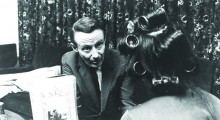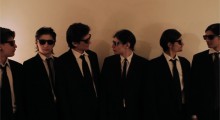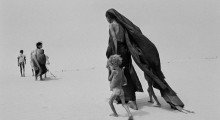Features
-
Getting Strong Now: Andrew Bujalski on Results

Andrew Bujalski’s first three features — Funny Ha Ha, Mutual Appreciation and Beeswax — were all more or less of a piece: illusorily casual 16mm portraits of young people in ambiguously comfortable stasis in, respectively, Boston, Brooklyn and Austin. Computer Chess, released in 2013, was a total UFO both in relation to his work and in relation to just about everything else. Film was out, but instead of clean digital, Bujalski shot on three 1969 SONY AVC-3260 cameras, its unfamiliar type of black-and-white grain making even denser a complicated comedy about a computer chess conference happening sometime in the late […]
-
Act Naturally

“Giving the movie its comic and poignant dimension is Brennan’s performance as Brennan.” In the wake of Albert Maysles’ death in March, I returned to this intriguing reference to “performance” in Vincent Canby’s 1969 review of Salesman, Albert and David Maysles’ landmark work of direct cinema. Canby was, of course, referring to Paul Brennan, affectionately known as “The Badger.” Brennan’s performance — if we can call it that — is indeed astonishing. A man of unremarkable looks, he holds the screen with an enthralling intensity. Of course, Brennan isn’t an actor but rather a “real person,” a documentary subject of […]
-
I’ll Come Running: Alfonso Gomez-Rejon and Jesse Andrews on Me and Earl and the Dying Girl

Those are people who died, died! They were all my friends, and they died! — Jim Carroll Do you remember your first experience with death? Most likely it was a grandparent passing. Or maybe a parent? Or, quite possibly, someone you knew at school, whether or not that person was a close friend. I remember mine — the younger brother of an elementary school classmate. He’d always prank on his older brother in the line to get into school each day, sneaking up on him from behind and then grabbing his lunch bag. A tug of war would ensue, the […]
-
A Band Apart: Crystal Moselle on The Wolfpack

It’s a stretch of the Lower East Side like any other, with public housing towers looming unostentatiously overhead. One of these is the home of the Angulo brothers — six siblings confined for years (save sporadic supervised walks) to their apartment by their father, Oscar. Crystal Moselle’s first feature The Wolfpack — winner of the Documentary Grand Jury Prize at this year’s Sundance Film Festival — is the result of an accidental street meeting between the documentarian and her future subjects just as they were starting to regularly go outside in defiance of their dad. There are obvious questions of […]
-
The Silent Treatment: Director Miroslav Slaboshpitsky on The Tribe

The word “bravura” gets thrown around all too often in the realm of ambitious filmmaking (perhaps in arts criticism in general?), but there is seemingly no other word to describe the colossal craft on display in Ukrainian helmer Miroslav Slaboshpitsky’s Cannes 2014-premiering debut feature, The Tribe. The film’s narrative — which hews somewhat to the genre obligations of a Western, as Slaboshpitsky points out — concerns a young man, Sergey (Grigoriy Fesenko), who is a newcomer at a deaf boarding school in Ukraine. No sooner has Sergey arrived than he realizes that the school is run by its administration in […]
-
Destination: Fargo

“Talking about dreams is like talking about movies, since the cinema uses the language of dreams,” Federico Fellini once said. “Years can pass in a second, and you can hop from one place to another. It’s a language made of image. And in the real cinema, every object and every light means something, as in a dream.” Cinema’s oneiric qualities have long been discussed by filmmakers and film theorists alike. Hollywood is even referred to as “the Dream Factory,” but that sobriquet refers as much to the industrial production and export model of the motion picture business as it does […]
-
On Both Sides of the Lens

Is there another contemporary documentary director who has so lovingly — and yet so quizzically — explored the work of his own artistic inspirations as Wim Wenders? With his patient, probing camera eye and, often, ruminative German-accented voiceover, Wenders has captured the work of filmmakers (Nicholas Ray, Yasujirō Ozu), choreographers (Pina Bausch), fashion designers (Yohji Yamamoto) and many, many musicians (Blind Willie Johnson, U2 and the players featured in Buena Vista Social Club, among others). Wenders approaches these talents humbly — in some cases as a colleague, but most often as a fan and admirer. And as much as Wenders’ […]
-
Any Color You Like: Writer/Director Jill Soloway on her Golden Globe-Winning Transparent

Speaking about the transgender movement and his leading role on the new Amazon Original series Transparent, actor Jeffrey Tambor exuberantly told Entertainment Weekly, “This is a brave new world.” From Emmy-nominated Laverne Cox’s Time Magazine cover to landmark federal policy laws, 2014 was an explosive year for transgender visibility and politics. Alongside these milestones, Jill Soloway’s groundbreaking new show mines the emotional landscape of trans-ness with a feeling-driven, multi-dimensional story of a family’s reckoning with a retired professor (Tambor, in a brilliantly nuanced performance) coming out as transgender. Funny, poignant and provocative, it’s been hailed as one of the best […]
-
5 Things Cinematographers Don’t Talk About

I only faintly recall writing my last entry for Filmmaker Magazine. I was huddled over at some bar at a busy airport, in between jobs and cities I’ve only seen through the windows of a hotel: a cinematographer’s life. I do remember the article was a bit cheeky — I was pretty elated with the success of It Felt Like Love — so I thought this time that to commemorate Kumiko, the Treasure Hunter I’d get down to brass tacks. Here are five things cinematographers don’t talk about. 1. When to Say No Possibly one of the hardest parts of […]
-
Lost in a Dream

“I don’t think humans communicate well.” —Lisandro Alonso I agree with the Argentine director. In our present age — when everyone has to be “connected” all the time, doing more than one thing — the chatter, the noise, can be maddening. Encountering the work of Lisandro Alonso makes me recall the feeling of lying on the floor and listening to a record as a teenager: not texting or talking or answering emails, simply listening. Alonso’s films let the viewer pay attention and dream simultaneously. Spare in dialogue, attentive to landscapes, meditative in pacing, they allow one to get lost in […]
